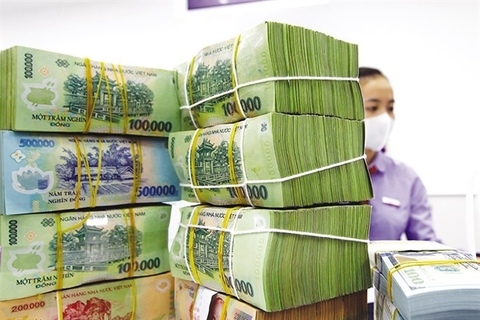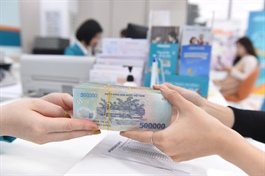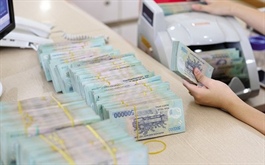Cutting rates too quickly could lead to credit risk
Cutting rates too quickly could lead to credit risk
The Government has introduced measures to stimulate credit growth to spur the economy, but experts are concerned loans could flow into risky industries that are the most capital thirsty with high absorption capacity.

A bank teller counts cash in Hà Nội. The central bank plans to further reduce rates this year. — Photo tinnhanhchungkhoan.vn |
As firms are facing many difficulties and the capital absorption of the economy in the first half of 2023 hit the lowest level in the past 13 years, the Government has urgently required the banking industry to further reduce interest rates and pump capital into the economy.
After four rate cuts this year, Deputy Governor of the State Bank of Vietnam (SBV) Đào Minh Tú said if conditions are favourable, the central bank will make further cuts before the end of the year.
However, even if the SBV’s policy rate does not decrease, the Government has asked commercial banks to try and cut rates based on cost reductions.
Many large firms have been offered loans by banks with interest rates of 7 to 9 per cent. However, not all firms can have access to this lower rate. Vũ Công Huân, director of HDC Group Joint Stock Company, said his company is having to borrow unsecured loans with an interest rate of 14 per cent, which is still lower than last year, but obviously unsustainable nonetheless.
Dr Nguyễn Thị Mùi, a member of the National Monetary and Financial Policy Advisory Council, said expanding credit in the current context is difficult, banks cannot lend when firms cannot prove their ability to repay loans and are unable to manage cash flows.
Many firms asked banks for unsecured loans, but promoting unsecured lending is not possible when the two sides have not built trust, Mùi said, explaining that cheap or subprime credit is very risky and if banks are not careful, it could spillover and affect other areas of the economy, much like in the US in 2008.
Nguyễn Quốc Hùng, General Secretary of the Vietnam Banks Association, also noted the responsibility of the lender is greater than that of the borrower, which feeds into a bad debt cycle. Banks can't lend at all costs: they must first ensure safety.
Data from FiinGroup showed in the second quarter of 2023, the total profit of non-bank firms decreased by nearly 42 per cent. According to FiinGroup, firms no longer have high financial leverage, but are eating through capital nonetheless.
Instead of pushing new credit into the economy, the Government’s policies should focus on lowering rates and rescheduling existing rates and loan payment times.
Monetary policy is shifting to a more flexible and loose direction, but according to Phạm Chí Quang, Director of the SBV’s Monetary Policy Department, relying on credit to boost the economy is not the safest measure.
An economy based on high lending poses systemic risks as bank capital is short-term while the demand for medium and long-term loans is huge. Besides bank credit, it is necessary to focus on developing other safe capital channels such as the stock and corporate bond markets, Quang suggested.
Dr. Lê Duy Bình, Managing Director of Economica Vietnam, said lowering interest rates and recklessly injecting credit into the economy could cause a boost in speculative fields, leading to market bubbles. Therefore, credit growth should only be at a reasonable dose to stimulate economic growth.
Real estate is the most capital-thirsty industry, with high capital absorption capacity. This is also a highly pervasive field if capital flows into segments serving real needs such as residential and industrial park projects. Funding for real estate recovery is one of the necessary solutions to warm up the current economy.
However, real estate is a high-risk sector and relying on cheap credit will have dangerous consequences. Besides interest rate cuts to stimulate production, there must be solutions to warm up the stock and bond markets to reduce the dependence on bank credit.
Fortunately, the stock market has recovered since the beginning of this year while the bond market seems to have passed its most difficult period.
Lower interest rates are supporting the two markets. The missing piece of the puzzle is investor confidence.





















